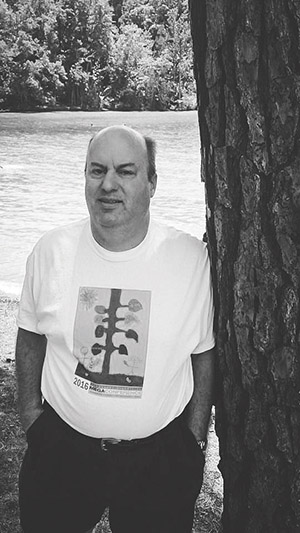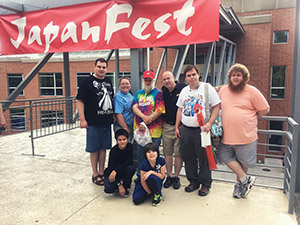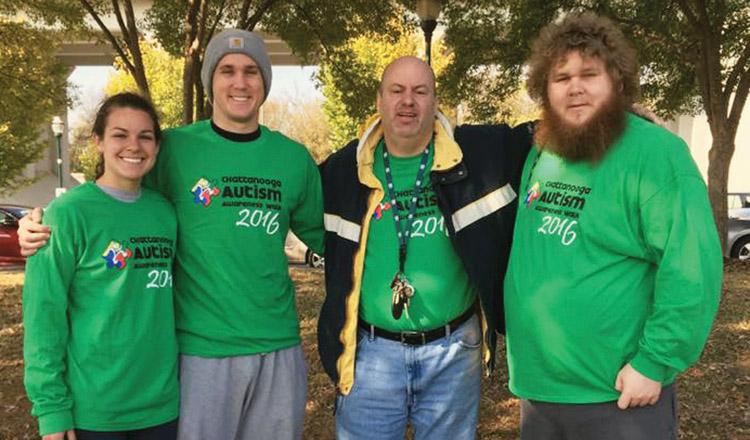Birds on a wire are a fairly common sight; but for Scott Kramer (HHS’00), they represent a turning point in his life. “I was waiting for a bus, and I saw all these birds congregating together on a power line,” he says. “I noticed one bird off by itself, and I wondered if it would join the others or stay where it was. After a while, I realized it was going to stay by itself — and it was like a light had switched on in my mind.”
Almost nine months before, Kramer had been diagnosed with autism spectrum disorder (ASD) at the age of 40. His life up to that point had been a series of challenging tidal waves, as he calls them. He spent years feeling isolated, shunned, and disillusioned. But when he saw the birds, he came to a conclusion. “I decided I was going to be OK,” he says. “I realized I didn’t have to fit in with everyone else, and I didn’t have to subscribe to others’ ideas about how I needed to live my life — I could just be myself.”
Kramer explains that many people on the autism spectrum don’t fit within the norms of society. According to the National Institutes of Health, ASD can cause significant social, communication, and behavioral issues. Individuals with ASD may have trouble reading body language or vocal cues and exhibit poor nonverbal conversation skills.

Growing up in the 1970s and ’80s, Kramer says he habitually felt different from others and experienced trouble communicating. Visits to doctors and specialists yielded no firm results — it was suggested that he might suffer from an intellectual disability or cerebral palsy. “My mom did not believe any of those things, but the tools and knowledge available back then were not what they are today,” he says. “She did the very best she could. But being told that you are not diagnosable is very unsettling — you feel like something’s really wrong with you. I fell through the cracks a lot growing up just because I was a mystery to people.”
A strong work ethic and a desire to succeed led Kramer to Purdue; he credits the University’s Span Plan program for recognizing his needs as a nontraditional student and providing support that allowed him to develop a clear path to graduation. Earning his bachelor’s degree was a great triumph, but he continued to feel like an outlier much of the time. Kramer describes gaining employment but not fitting in and says it’s common for individuals on the autism spectrum to meander from job to job, never attaining fulfillment. He found himself floundering until his girlfriend, a physician, suggested he might have ASD.
To some, reaching a clear diagnosis after so many years of confusion might have offered a sense of relief. But Kramer’s reaction was the opposite. “I fell into despair,” he says. “I couldn’t understand it — I felt like I had accomplished so much in my life and was taking a step backwards. I went through a dark period where I wouldn’t see people and was just trying to put the pieces together in my head.” After coming to the realization that it was OK to not fit in with everyone else, he began looking for ways to help others understand that as well.
Kramer spent several years participating in online chat rooms devoted to ASD, but he really desired offline interaction. He searched for social support groups in his area of Chattanooga, Tennessee, but none existed that were solely for adults. “I knew that if I was seeking a support group for autistic adults, there had to be other people who wanted the same thing,” he says. “Children with autism become adults with autism — it doesn’t go away. There’s a lack of resources for adults after they leave the protection of secondary schools, but the need is still there.” Kramer decided to take matters into his own hands and began creating social opportunities for other autistic adults. The support groups he established led to the creation of the GCA Centre for Adult Autism of the Southeast USA. Kramer serves as the director of the organization and is a strong voice for autism advocacy.
His efforts were beneficial not only to adults on the autism spectrum but also to their families, Kramer found. “I kept getting calls from parents of autistic adults, and they would ask me how to get their children off the computer and out into the world,” he says. “They also had concerns about the future and how their children would manage when they were no longer around to take care of them.” Sensing a need for educational opportunities that didn’t exist in his region, Kramer developed a conference geared towards autistic adults and their families.

The inaugural Tri-State Adult Autism Symposium took place in July and focused on issues such as employment, health and wellness, independent living, and social relationships. According to Kramer, it is the only US conference for autistic adults east of the Mississippi River. Max*, a 20-year-old with ASD who attended with his parents, showed significant changes following the event. “Max was able to communicate his needs, as he learned at the conference, to a potential employer,” his mom says. “He was offered a job, and it is going great. He’s now talking about how he could one day present on a panel about independent living. Kramer’s work is changing lives, and we are so grateful.”
Kramer is busy planning next year’s symposium and hopes to bring in more presenters with ASD who are in the workforce; he wants to expand the event’s reach and impact as many lives as he can. For his tireless leadership and commitment to enriching the lives of individuals on the autism spectrum, Kramer was recently honored with the North Georgia Autism Conference 2017–2018 Volunteer of the Year Award. Although proud of his accomplishments, he remains focused on helping others. “I look at my life, and it’s all about purpose and passion,” he says. “I’m dedicated to reaching out to people and providing hope. There’s a strong need for that kind of support.”
*Name has been changed.

